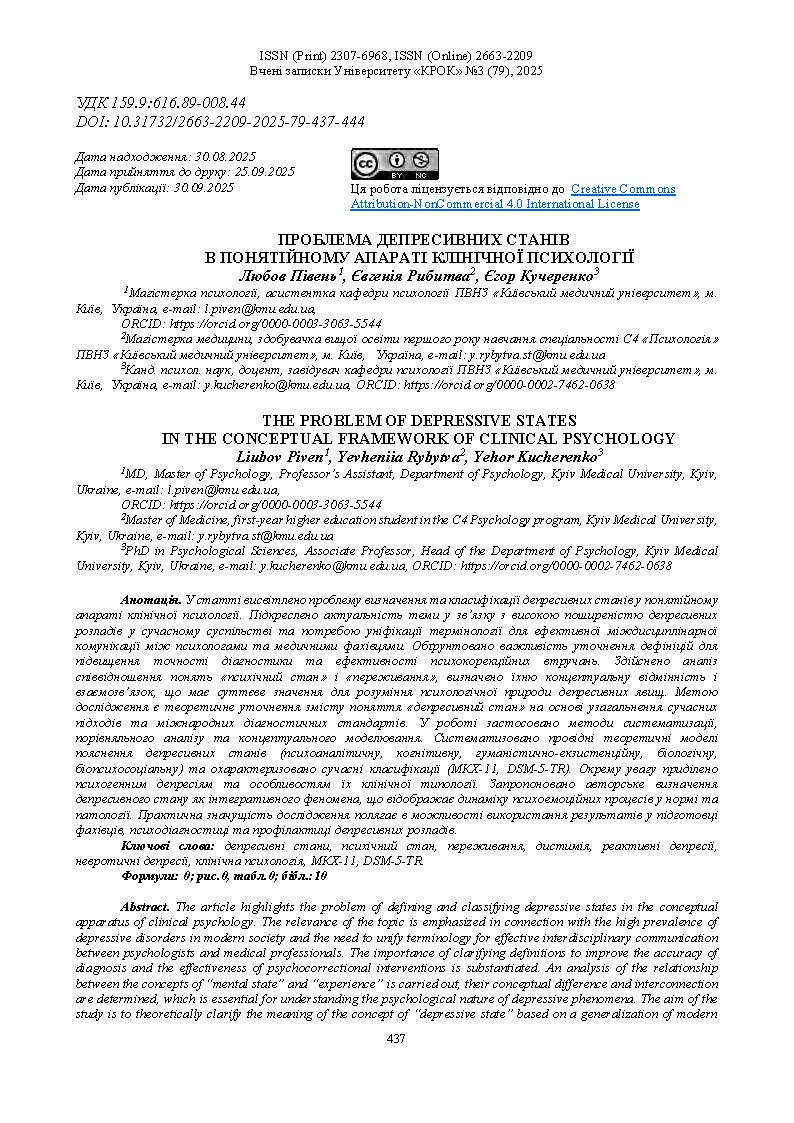ПРОБЛЕМА ДЕПРЕСИВНИХ СТАНІВ В ПОНЯТІЙНОМУ АПАРАТІ КЛІНІЧНОЇ ПСИХОЛОГІЇ
DOI:
https://doi.org/10.31732/2663-2209-2025-79-437-444Ключові слова:
депресивні стани, психічний стан, переживання, дистимія, реактивні депресії, невротичні депресії, клінічна психологія, МКХ-11, DSM-5-TRАнотація
У статті висвітлено проблему визначення та класифікації депресивних станів у понятійному апараті клінічної психології. Підкреслено актуальність теми у зв’язку з високою поширеністю депресивних розладів у сучасному суспільстві та потребою уніфікації термінології для ефективної міждисциплінарної комунікації між психологами та медичними фахівцями. Обґрунтовано важливість уточнення дефініцій для підвищення точності діагностики та ефективності психокорекційних втручань. Здійснено аналіз співвідношення понять «психічний стан» і «переживання», визначено їхню концептуальну відмінність і взаємозв’язок, що має суттєве значення для розуміння психологічної природи депресивних явищ. Метою дослідження є теоретичне уточнення змісту поняття «депресивний стан» на основі узагальнення сучасних підходів та міжнародних діагностичних стандартів. У роботі застосовано методи систематизації, порівняльного аналізу та концептуального моделювання. Систематизовано провідні теоретичні моделі пояснення депресивних станів (психоаналітичну, когнітивну, гуманістично-екзистенційну, біологічну, біопсихосоціальну) та охарактеризовано сучасні класифікації (МКХ-11, DSM-5-TR). Окрему увагу приділено психогенним депресіям та особливостям їх клінічної типології. Запропоновано авторське визначення депресивного стану як інтегративного феномена, що відображає динаміку психоемоційних процесів у нормі та патології. Практична значущість дослідження полягає в можливості використання результатів у підготовці фахівців, психодіагностиці та профілактиці депресивних розладів.
Завантаження
Посилання
Довідник діагностичних критеріїв DSM-5-TR® від Американської психіатричної асоціації (2024). пер. з англ. О. Лизак, М. Прокопович, О. Антонишин. Львів : Компанія Манускрипт. 592 с.
Кокун, О. М. (2012). Оптимізація психофізіологічних ресурсів людини: концепція та методи. Київ : Міленіум. 320 с.
Максименко, С. Д. (2006). Генеза здійснення особистості. Київ : Видавництво ТОВ «КММ». 256 с.
Мішиєв, В. Д., Михайлов, Б. В., & Гриневич, Є. Г. (2024). МКХ-11. Розділ 06: Психічні і поведінкові розлади та порушення нейропсихічного розвитку. Статистична класифікація. Київ : Моріон. 300 с.
Рибитва, Є. В., & Кучеренко, Є. В. (2024). Теоретичні засади дослідження депресивних станів у лікарів-інтернів. Перспективи розвитку сучасної психології : зб. наук. пр. УГСП. Київ : 7БЦ. Вип. 15. С. 226–229.
Юнг, К. Г. (2025). Аналітична психологія. Тавістокські лекції. Київ : Центр навчальної літератури. 340 с.
Assagioli, R. (1974). Psychosynthesis. A Manual of Principles and Techniques. New York : Viking Compass Edition. 260 p.
Kielholz P. (1972). Depressive Illness. Diagnosis, Assessment and Treatment. Bern : H. Huber. 302 p.
Maslow, A. (1998) Toward a psychology of being. 2nd ed. New York : Wiley, 1998. 274 p.
Rogers, C. R. (1961). On becoming a person: A therapist’s view of psychotherapy. Boston : Houghton Mifflin. 420 p.

Downloads
Опубліковано
Як цитувати
Номер
Розділ
Ліцензія

Ця робота ліцензується відповідно до Creative Commons Attribution-NonCommercial 4.0 International License.

